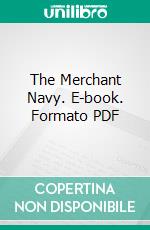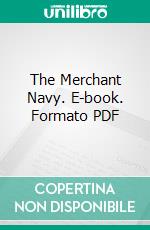Archibald Hurd eBooks
eBooks di Archibald Hurd
The Merchant Navy. E-book. Formato PDF Archibald Hurd - Forgotten Books, 2017 -
When the peace was broken on August 4th, 1914, nothing suggested that British merchant seamen would fare worse than their predecessors of the Napoleonic era, and the statement that they would be compelled to face perils in intensity and variety unparalleled in human experience would have been rejected as unbelievable in face of all the efforts made at The Hague to humanise warfare. Events falsified all anticipations.After the comparative failure of the attack on commerce by surface craft -cruisers and auxiliary cruisers - the enemy became convinced that in the submarine he had found the means of cutting the communications of the British Empire, and of shutting off from the European battle-fields the essential supplies without which the troops could not continue to fight. The use of the submarine for commerce destruction involved the infraction of international law as well as the ignoring of the code of humanity, since these small craft, packed with machinery and equipped for war, were unable to accommodate the crews of ships sunk, whether by torpedo, gunfire, or bombs. The German flag had already been banished from the highways of the world. So, in desperation, it was decided, whatever the loss of human life might be, and without respect for considerations of law, however widely recognised, to embark on a policy which, rightly or wrongly, became generally known as piracy.This decision changed the whole aspect of the War so far as merchant seamen were concerned. As the campaign made progress it became apparent that the British merchant seamen were being forced by circumstances, over which neither they nor the British naval authorities had any control, into the forefront of the struggle by sea.
The Merchant Navy. E-book. Formato PDF Archibald Hurd - Forgotten Books, 2017 -
During this period of twenty months the war at sea passed through what may be called an intermediate stage. In the spring of 1915 the American President came for ward as the general advocate of neutral rights at sea. Although he confined his protests to cases in which the sovereign rights of the United States had been disregarded, Mr. Wilson none the less became, in effect, the spokesman of all neutrals. The sinking of the Arabic in September brought on a crisis between America and Germany, and at the end of the month the Imperial Government stated that it regretted and disapproved the incident. No guarantee for the future was given; but the American Government was satisfied, knowing, probably, that the apology meant more than appeared. Washington had, in fact, scored a diplomatic victory; for the German Government had ordered their submarine commanders to cease from any form of submarine war on the West Coast of Great Britain or in the Channel. In the Medi terranean, sinkings went on much as usual, as there was here less chance of injuring American citizens. For the rest of the year a restricted form of submarine warfare, against which the American Government made no protest, continued in the zone of operations.

